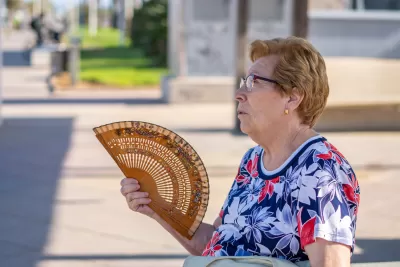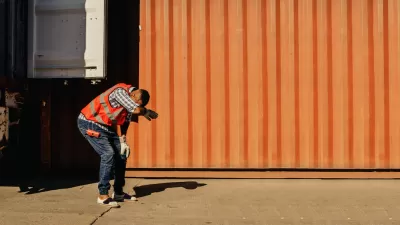Without the resources of larger cities, towns with fewer resources can still work to coordinate efforts across agencies and plan for heat events early in the year.

How can small towns that lack the resources of bigger cities prepare their agencies and residents to prepare for and respond to extreme heat events? Ysabelle Kempe explores the issue in Smart Cities Dive.
While some cities such as Phoenix and Houston have hired Chief Heat Officers tasked with leading cross-departmental efforts to address extreme heat events, others don’t have the funding to do so. In an interview with Smart Cities Dive, Ladd Keith, assistant professor of planning and sustainable built environments at the University of Arizona, said “Because heat is a relatively new climate risk compared to other climate risks, it’s not surprising at all to see that a couple silver bullet strategies have emerged because when you first learned about something, your knowledge is really limited.”
For Keith, one key strategy is coordination between various city and county departments, whether or not the city is able to hire a full-time climate or heat officer. For now, “I think where we’ve ended up is a lot of urban forestry efforts and a lot of focus on cooling centers.” Keith also recommends year-round planning for summer operations. “It’s not great to plan for cooling centers when it’s already hot and when it’s already summer because you’re going to have a little bit less effective coordination and missed opportunities with that.”
FULL STORY: Without chief heat officers, how can smaller cities respond to extreme heat?

Study: Maui’s Plan to Convert Vacation Rentals to Long-Term Housing Could Cause Nearly $1 Billion Economic Loss
The plan would reduce visitor accommodation by 25,% resulting in 1,900 jobs lost.

North Texas Transit Leaders Tout Benefits of TOD for Growing Region
At a summit focused on transit-oriented development, policymakers discussed how North Texas’ expanded light rail system can serve as a tool for economic growth.

Using Old Oil and Gas Wells for Green Energy Storage
Penn State researchers have found that repurposing abandoned oil and gas wells for geothermal-assisted compressed-air energy storage can boost efficiency, reduce environmental risks, and support clean energy and job transitions.

Santa Barbara Could Build Housing on County Land
County supervisors moved forward a proposal to build workforce housing on two county-owned parcels.

San Mateo Formally Opposes Freeway Project
The city council will send a letter to Caltrans urging the agency to reconsider a plan to expand the 101 through the city of San Mateo.

A Bronx Community Fights to Have its Voice Heard
After organizing and giving input for decades, the community around the Kingsbridge Armory might actually see it redeveloped — and they want to continue to have a say in how it goes.
Urban Design for Planners 1: Software Tools
This six-course series explores essential urban design concepts using open source software and equips planners with the tools they need to participate fully in the urban design process.
Planning for Universal Design
Learn the tools for implementing Universal Design in planning regulations.
Ascent Environmental
Borough of Carlisle
Institute for Housing and Urban Development Studies (IHS)
City of Grandview
Harvard GSD Executive Education
Toledo-Lucas County Plan Commissions
Salt Lake City
NYU Wagner Graduate School of Public Service





























